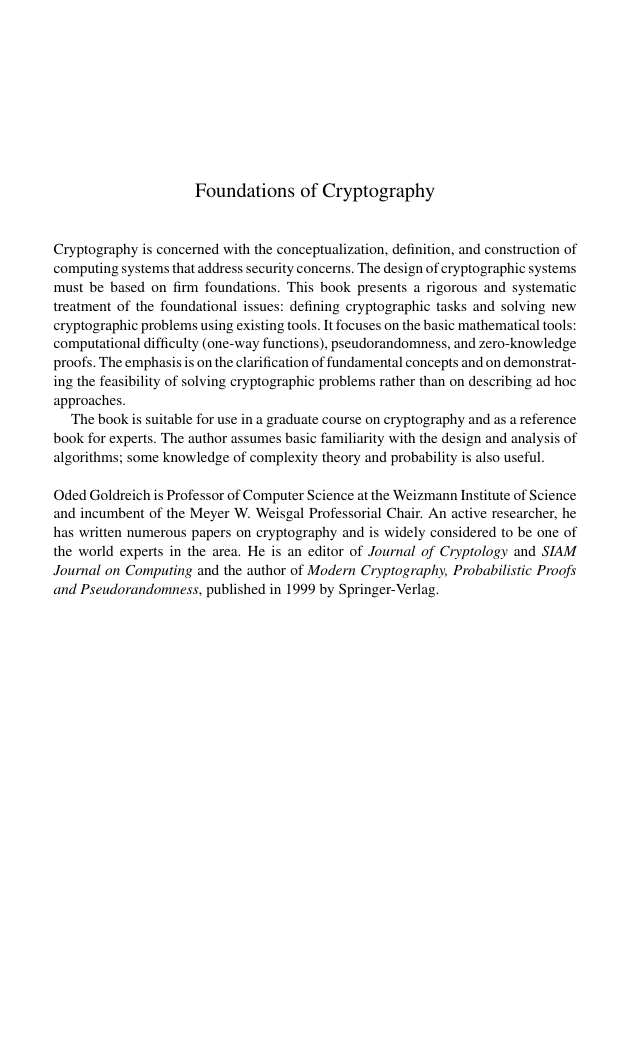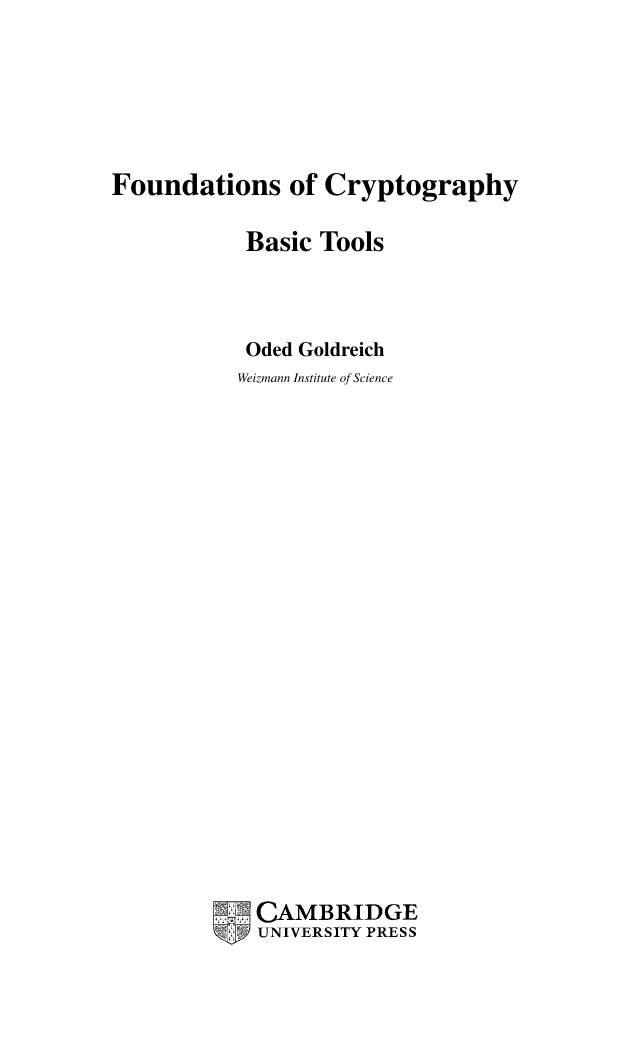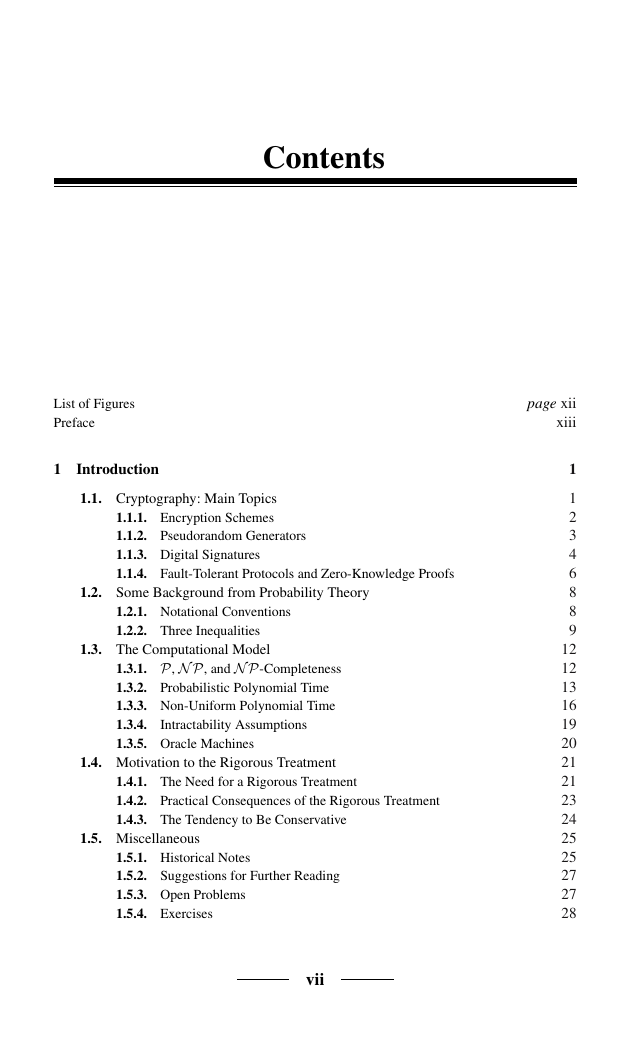�
Foundations of Cryptography
Cryptography is concerned with the conceptualization, definition, and construction of
computing systems that address security concerns. The design of cryptographic systems
must be based on firm foundations. This book presents a rigorous and systematic
treatment of the foundational issues: defining cryptographic tasks and solving new
cryptographic problems using existing tools. It focuses on the basic mathematical tools:
computational difficulty (one-way functions), pseudorandomness, and zero-knowledge
proofs. The emphasis is on the clarification of fundamental concepts and on demonstrat-
ing the feasibility of solving cryptographic problems rather than on describing ad hoc
approaches.
The book is suitable for use in a graduate course on cryptography and as a reference
book for experts. The author assumes basic familiarity with the design and analysis of
algorithms; some knowledge of complexity theory and probability is also useful.
Oded Goldreich is Professor of Computer Science at the Weizmann Institute of Science
and incumbent of the Meyer W. Weisgal Professorial Chair. An active researcher, he
has written numerous papers on cryptography and is widely considered to be one of
the world experts in the area. He is an editor of Journal of Cryptology and SIAM
Journal on Computing and the author of Modern Cryptography, Probabilistic Proofs
and Pseudorandomness, published in 1999 by Springer-Verlag.
�
Foundations of Cryptography
Basic Tools
Oded Goldreich
Weizmann Institute of Science
�
The Pitt Building, Trumpington Street, Cambridge, United Kingdom
The Edinburgh Building, Cambridge CB2 2RU, UK
40 West 20th Street, New York, NY 10011-4211, USA
477 Williamstown Road, Port Melbourne, VIC 3207, Australia
Ruiz de Alarcón 13, 28014 Madrid, Spain
Dock House, The Waterfront, Cape Town 8001, South Africa
http://www.cambridge.org
©
Oded Goldreich 2004
First published in printed format
2001
ISBN 978-0-511-54689-1 OCeISBN
ISBN 0-521-79172-3 hardback
First published 2001
Reprinted with corrections 2003
�
To Dana
�
�
Contents
List of Figures
Preface
1 Introduction
1.1. Cryptography: Main Topics
1.1.1. Encryption Schemes
1.1.2. Pseudorandom Generators
1.1.3. Digital Signatures
1.1.4. Fault-Tolerant Protocols and Zero-Knowledge Proofs
1.2. Some Background from Probability Theory
1.3. The Computational Model
1.2.1. Notational Conventions
1.2.2. Three Inequalities
1.3.1. P, NP , and NP -Completeness
1.3.2. Probabilistic Polynomial Time
1.3.3. Non-Uniform Polynomial Time
1.3.4.
1.3.5. Oracle Machines
Intractability Assumptions
1.4. Motivation to the Rigorous Treatment
1.4.1. The Need for a Rigorous Treatment
1.4.2. Practical Consequences of the Rigorous Treatment
1.4.3. The Tendency to Be Conservative
1.5. Miscellaneous
1.5.1. Historical Notes
1.5.2. Suggestions for Further Reading
1.5.3. Open Problems
1.5.4. Exercises
vii
page xii
xiii
1
1
2
3
4
6
8
8
9
12
12
13
16
19
20
21
21
23
24
25
25
27
27
28
�
















 2023年江西萍乡中考道德与法治真题及答案.doc
2023年江西萍乡中考道德与法治真题及答案.doc 2012年重庆南川中考生物真题及答案.doc
2012年重庆南川中考生物真题及答案.doc 2013年江西师范大学地理学综合及文艺理论基础考研真题.doc
2013年江西师范大学地理学综合及文艺理论基础考研真题.doc 2020年四川甘孜小升初语文真题及答案I卷.doc
2020年四川甘孜小升初语文真题及答案I卷.doc 2020年注册岩土工程师专业基础考试真题及答案.doc
2020年注册岩土工程师专业基础考试真题及答案.doc 2023-2024学年福建省厦门市九年级上学期数学月考试题及答案.doc
2023-2024学年福建省厦门市九年级上学期数学月考试题及答案.doc 2021-2022学年辽宁省沈阳市大东区九年级上学期语文期末试题及答案.doc
2021-2022学年辽宁省沈阳市大东区九年级上学期语文期末试题及答案.doc 2022-2023学年北京东城区初三第一学期物理期末试卷及答案.doc
2022-2023学年北京东城区初三第一学期物理期末试卷及答案.doc 2018上半年江西教师资格初中地理学科知识与教学能力真题及答案.doc
2018上半年江西教师资格初中地理学科知识与教学能力真题及答案.doc 2012年河北国家公务员申论考试真题及答案-省级.doc
2012年河北国家公务员申论考试真题及答案-省级.doc 2020-2021学年江苏省扬州市江都区邵樊片九年级上学期数学第一次质量检测试题及答案.doc
2020-2021学年江苏省扬州市江都区邵樊片九年级上学期数学第一次质量检测试题及答案.doc 2022下半年黑龙江教师资格证中学综合素质真题及答案.doc
2022下半年黑龙江教师资格证中学综合素质真题及答案.doc